385

Front view of the University of Winnipeg and U of W Collegiate, take from Portage Avenue. Photo: KrazyTea/Wikimedia

By Maggie Macintosh | Winnipeg Free Press Concerns about campus security are growing as Brandon University professors question why it’s taking so long for their employer to conduct a safety audit, while University of Winnipeg colleagues condemn a new access policy developed behind closed d...
This article is available to registered HR News Canada members. Membership is free and provides full access to our independent reporting on workplace HR issues across Canada.
Already a member? Log in below
The Local Journalism Initiative (LJI) supports the creation of original civic journalism that covers the diverse needs of underserved communities across Canada.

HR News Canada is an independent source of workplace news for human resources professionals, managers, and business leaders. Published by North Wall Media.
©2026 All Right Reserved. Designed and Developed by North Wall Media